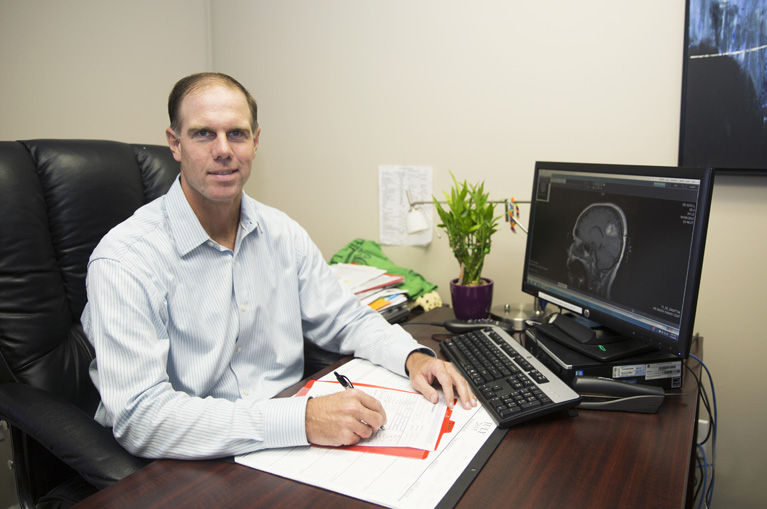
Many people might call Dr. Brad McCollom a brain surgeon – which he is. But he is also much more than that.
A board certified neurosurgeon, this tall, blue-eyed graduate of the Western University of Health Sciences with neurosurgical residencies at New York’s Long Island Jewish Medical Center and New Jersey’s Garden City hospital on his resume says that 85 to 90 percent of his practice centers on spinal problems and pain relief.
McCollom’s Coastal Neurosurgery & Spine practice in Sebastian does perform brain surgeries, including the removal of tumors, but he also treats neck pain, cervical stenosis, carpal tunnel syndrome, ulnar nerve entrapment, lumbar stenosis, lumbar disc herniation and lumbar degenerative discs and other conditions.
One of the most exciting brain surgeries he undertakes is a highly effective procedure for treating a dementia-like condition that the Alzheimer’s Association says, “primarily affects people in their 60s and 70s.”
That condition is called, “normal pressure hydrocephalus,” or NPH, and its symptoms can mirror those of Alzheimer’s and Parkinson’s. According to the Cleveland Clinic, symptoms can include memory loss, thought and reasoning problems, difficulty in walking and loss of bladder control.
The exciting part? Unlike Alzheimer’s and Parkinson’s, NPH can be reversed.
In the simplest of terms, NPH is caused by excess fluid accumulating in the hollow chambers of the brain called the “ventricles.” The condition is called “normal pressure” because despite that fluid buildup, pressure levels measured during tests such as spinal taps often appears to be normal.
According to McCollom, “a physical exam as well as MRI scans are needed to accurately diagnose the condition.”
The surgical treatment for NPH is a shunt operation. A shunt – or thin tube – is implanted into the ventricles of the brain to drain the excess fluid. That tube is then routed under the skin away from the head to another part of the body, usually the lower belly. The shunt is equipped with a valve that automatically releases fluid when the pressure inside the brain starts to build up. Fluid is then absorbed harmlessly into the bloodstream and the symptoms disappear. The surgery requires precision and skill, but the fact that any form of dementia can be surgically reversed is at the very least a small glimmer of hope for many.
Meanwhile, the bulk of McCollom’s practice may seem somewhat less exotic by comparison but for patients suffering from neck pain, cervical stenosis, carpal tunnel syndrome, ulnar nerve entrapment and such, getting relief can be a life-changing event.
The American Association of Neurological Surgeons explains that, “neck pain may be caused by disc degeneration, narrowing of the spinal canal, arthritis, and, in rare cases, cancer or meningitis.” Getting expert diagnosis and treatment is essential for eliminating that pain.
Cervical stenosis, meanwhile, occurs when the spinal canal narrows and compresses or pinches the spinal cord. It is most frequently caused by the aging process. Discs in the spine that separate and cushion the vertebrae basically just dry out and lose their ability to act as shock absorbers. The resulting pain can be debilitating so, again, diagnosis and treatment are keys to making life better.
Carpal tunnel syndrome, as many who have spent hours doing repetitive tasks such as typing may already know, is caused by a compressed or pinched nerve in the wrist. The Mayo Clinic describes the carpal tunnel as, “a narrow passageway located on the palm side of the wrist. This tunnel protects the main nerve to the hand, (the “median” nerve), and the nine tendons that bend the fingers.”
The University of Florida’s Department of Neurology says, “Conservative treatment (for carpal tunnel syndrome) may involve an extension wrist splint and the use of non-steroidal anti-inflammatory pain relievers.”
However, “those with severe symptoms may be candidates for surgical decompression,” and that’s a procedure McCollom knows well. It’s an outpatient surgery with a high success rate. “Carpal tunnel surgery is about a 20 minute procedure,” according to the affable McCollom, “and people recover very quickly.”
Ulnar nerve entrapment, meanwhile, is described by the Johns Hopkins Medical Center in Baltimore as, “an often a painful disorder of the outer side of the arm and hand near the little finger caused by pressure on the ulnar nerve in the arm.”
Once again, conservative or non-surgical treatments are the starting point for relief but should physical therapy or medications or a combination thereof not yield results, McCollom can address the problem surgically.
Through non-surgical procedures and treatment plans or through the latest surgical techniques, McCollom sums up his practice this way: “We can do a lot of good for a lot of people here.”
Dr. Brad McCollom is with Coastal Neurosurgery & Spine at 8005 Bay Street, Suite five in Sebastian, FL. The phone number is 772-581-8075.



